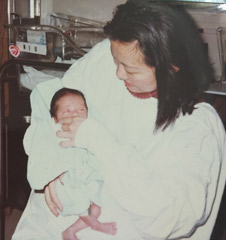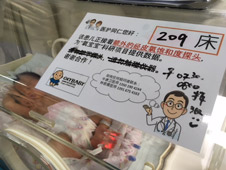Monday 13 August 2018 11:43am

Dr Conway Niu.
Friends of international PhD student, Dr Conway Niu, joke that his current research project – monitoring the oxygen levels of preterm babies – is taking him back to the comfort zone of his early days.
That’s because Dr Niu, like many of the babies he is studying, spent his first few months in an incubator as a preterm baby.
Although he doesn’t attribute his interest in neonatal research to this personal connection, Dr Niu, from the Department of Paediatrics and Child Health at the University of Otago, Wellington (UOW), is keen to see it lead to improved prospects for preterm babies.
Dr Niu has recently returned from three months monitoring the overnight drops in oxygen levels (intermittent hypoxia) of some 300 preterm and term babies in the Children’s Hospital of Fudan University in Shanghai.

Dr Niu as a baby, in hospital with his mother.
The data he has brought back will augment the information he is gathering on 100 preterm and term babies born in Wellington and Hutt hospitals, giving him a good-sized sample to base his research on.
As well as using the latest technology available – oximetry sensors capable of monitoring oxygen levels every two seconds – Dr Niu is carrying out regular follow-up visits to check the health, growth and development of each infant in the New Zealand study over their first year.
“While other groups have studied preterm babies at discharge from hospital, this study is comparing data from preterm babies with data from healthy term infants,” says American-born Dr Niu, who studied and worked at the Children’s Hospital of Fudan University for a couple of years after completing his medical studies in Shanghai. Dr Niu says he was drawn to further his study at the University of Otago, Wellington, by the research being carried at the Department of Paediatrics, and its balance of academia and clinical content.

A baby taking part in the study in Shanghai with oximetry sensors attached to his/her foot.
“We are finding that a lot of babies who appear otherwise healthy have these short drops in oxygen levels known as intermittent hypoxia,” Dr Niu says . “We want to see if these short drops in oxygen levels are significant for preterm babies – if there’s any relationship between them and the development of these babies as they grow.”
The study, which will wrap up at the end of 2018, complements other research on the development of preterm babies, being carried out by the University of Otago on its Wellington and Dunedin campuses.
The study received equipment funding from the Wellington Medical Research Foundation, funding from the University of Otago Priming Partnerships Fund for its Shanghai arm, and equipment support from Promed Technologies. Dr Niu’s PhD is supported by a UOW Doctoral Award. He is supervised by Professor Dawn Elder, Dr Angela Campbell, and Associate Professor Peter Larsen.
